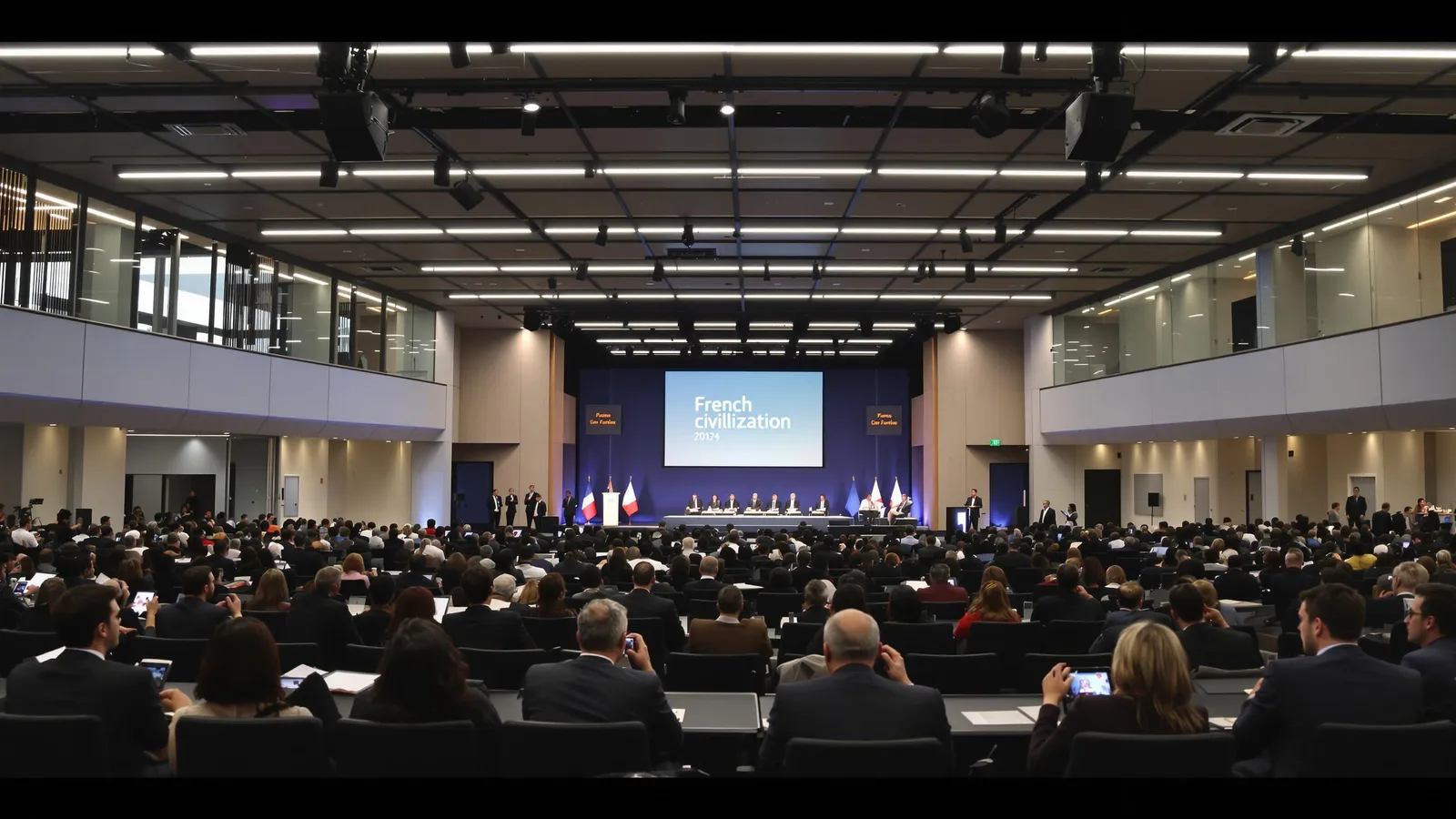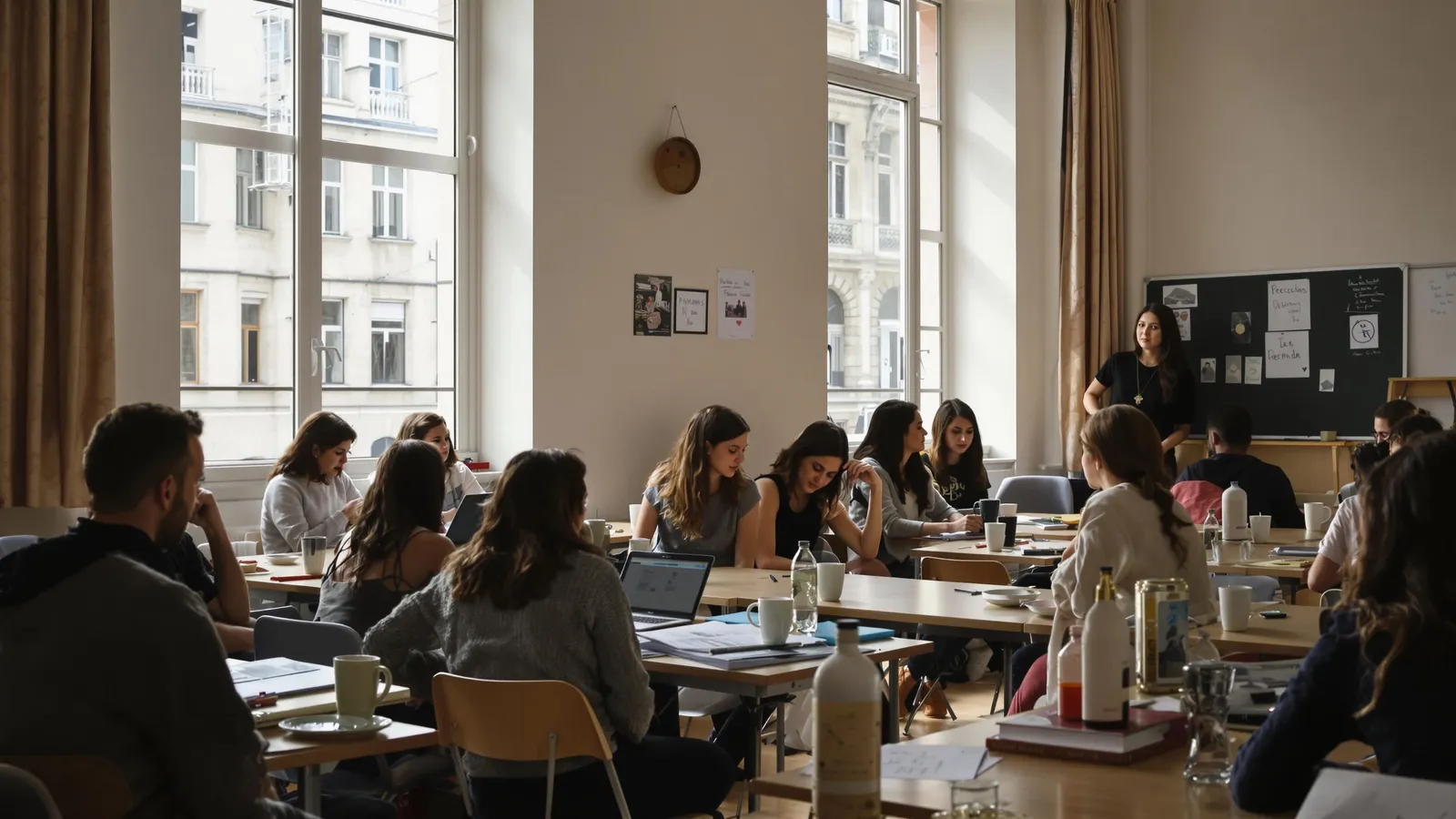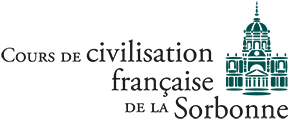Struggling to master the unique sounds of French? You’re not alone. Studies show that over 70% of learners find French pronunciation challenging due to its nasal vowels, liaisons, and silent letters. This is where French phonetics courses at the CCFS make a difference. Designed to improve spoken French, these courses combine cutting-edge technology with expert teaching to help you reduce your accent and speak with confidence.
In this article, discover how the CCFS’s innovative approach to phonetics can transform your French language learning experience. From mastering tricky sounds to real-world application in Paris, we’ll explore the tools and techniques that make these courses stand out.
Sommaire
- Mastering French Sounds Through Specialized Phonetics Training
- Innovative Teaching Strategies at CCFS
- Real-World Application and Cultural Immersion
- Measurable Progress in Accent and Fluency
Mastering French Sounds Through Specialized Phonetics Training
Why Phonetics Forms the Foundation of Spoken French
Mastering French phonetics is essential for understanding the nuances of spoken French. The French language presents unique challenges, such as nasal vowels, silent letters, and liaisons, which can be particularly difficult for non-native speakers. Phonetics serves as a bridge between written and spoken French, helping learners articulate sounds accurately and reduce their accent. For English speakers, the distinction between sounds like /y/ and /u/ is a common hurdle, as highlighted by the University of California, Berkeley’s French Department. Phonetic awareness not only improves comprehension but also enhances intelligibility, making it a cornerstone of effective communication in French.
Understanding the phonetic rules of French is the first step toward fluency. As explained in our article on Phonetics: A Tool to Master French Language, phonetics helps learners decode the differences between written and spoken French, such as the pronunciation of silent letters and the linking of words through liaisons. This foundational knowledge is crucial for anyone aiming to speak French with confidence and authenticity.
Here are the key challenges learners often face:
- Nasal vowels: The French language includes unique nasal sounds, such as /ɑ̃/, /ɔ̃/, and /ɛ̃/, which are challenging for non-native speakers to produce accurately.
- Silent letters: French pronunciation often omits certain letters, such as the silent “e” at the end of words, which can confuse learners accustomed to phonetic languages.
- Liaisons: The linking of words in spoken French, known as liaisons, requires practice to master, as they significantly affect fluency and comprehension.
- /y/ vs /u/: Distinguishing between the French /y/ (as in “tu”) and /u/ (as in “tout”) is a common hurdle for English speakers, leading to potential misunderstandings.
By addressing these challenges, learners can improve their pronunciation and fluency, making phonetics to learn French an indispensable part of their language journey.
The Science Behind CCFS’s Phonetics Methodology
The CCFS phonetics curriculum is designed to address the unique challenges of French pronunciation through a structured and scientific approach. One of the key components is the use of the International Phonetic Alphabet (IPA), which helps students visualize and understand French sounds accurately. This tool is particularly useful for mastering difficult sounds like nasal vowels and the French /r/. Additionally, audiovisual analysis allows students to analyze native French speech, helping them recognize and reproduce correct pronunciation patterns.
Immediate feedback is another critical element of the CCFS methodology. During lab sessions, students use recording tools to self-assess their pronunciation and compare it to native models. Instructors provide personalized feedback, ensuring that students correct mistakes in real-time. This hands-on approach, combined with theoretical knowledge, accelerates progress and builds confidence. For more details on the personalized monitoring offered by CCFS, visit our article on Phonetics Laboratory: Personalized Linguistic Monitoring at CCFS.
Here’s how the CCFS methodology works:
- IPA training: Students learn the International Phonetic Alphabet (IPA) to visualize and understand French sounds accurately.
- Audiovisual analysis: Multimedia tools are used to analyze native French speech, helping students recognize and reproduce correct pronunciation.
- Error correction: Immediate feedback from instructors ensures students correct mistakes in real-time, accelerating their progress.
- Lab sessions: Recording tools allow students to self-assess their pronunciation and compare it to native models.
This scientific approach ensures that students develop a strong foundation in French phonetics, making it easier to tackle the complexities of the language.
Innovative Teaching Strategies at CCFS
From Theory to Practice: Dual-Phase Learning
CCFS employs a dual-phase learning approach that combines theoretical knowledge with practical application to ensure comprehensive phonetic training. In the theoretical phase, students study essential aspects of French phonetics, including prosody, elision, and accentuation patterns. This foundational knowledge helps learners understand the rhythm and melody of French speech, which are crucial for achieving natural pronunciation.
The practical phase takes place in the phonetics lab, where students apply what they’ve learned through exercises like minimal pair drills and dialogue reenactments. These activities are designed to reinforce phonetic skills and improve pronunciation accuracy. Additionally, cultural immersion activities, such as visits to Parisian markets and museums, provide students with opportunities to practice their skills in real-world contexts. For a deeper dive into the immersive experience offered by CCFS, explore our Semester Intensive French Course.
Here’s a breakdown of the course components:
| Component | Description | Percentage of Course | Key Activities | Learning Outcomes |
|---|---|---|---|---|
| Theoretical Classes | Focus on phonetics theory, including prosody, elision, and accentuation patterns. | 30% | Lectures, IPA transcription exercises, sound analysis. | Understanding of French phonetic rules and sound articulation. |
| Lab Sessions | Practical application using recording tools and speech visualization software. | 40% | Minimal pair drills, dialogue reenactments, self-assessment recordings. | Improved pronunciation accuracy and self-correction skills. |
| Cultural Immersion | Exposure to French culture through field exercises and role-playing scenarios. | 20% | Market visits, museum tours, café conversations. | Enhanced listening skills and real-world communication confidence. |
| Assessments | Structured evaluations to track progress and measure improvement. | 10% | Pre/post-course speech analysis, vowel accuracy tests. | Quantifiable progress in accent reduction and fluency. |
This balanced approach ensures that students master both the science and art of French phonetics, preparing them for authentic communication in French-speaking environments.
Technology-Driven Pronunciation Labs
At CCFS, technology plays a pivotal role in helping students master French pronunciation. The phonetics labs are equipped with advanced tools like speech visualization software and accent comparison algorithms. These technologies allow students to analyze their pronunciation in detail, identifying specific areas for improvement. For instance, software like Praat provides visual feedback on pitch, intonation, and vowel accuracy, enabling students to compare their speech to native models.
Interactive exercises, such as minimal pair drills and dialogue reenactments, further enhance the learning experience. These activities are designed to reinforce phonetic skills in a dynamic and engaging way. The use of recording tools also allows students to track their progress over time, fostering a sense of achievement and motivation. For more insights into the personalized monitoring offered by CCFS, visit our article on Phonetics Laboratory: Personalized Linguistic Monitoring at CCFS.
Here’s how technology enhances learning:
- Speech visualization software: Tools like Praat help students analyze their pronunciation and identify areas for improvement.
- Accent comparison algorithms: Advanced software compares students’ speech to native models, providing precise feedback on pronunciation accuracy.
- Interactive exercises: Activities like minimal pair drills and dialogue reenactments reinforce phonetic skills in a dynamic, engaging way.
These technological innovations make pronunciation practice both effective and enjoyable, ensuring students achieve measurable progress in their phonetic skills.
Real-World Application and Cultural Immersion
Role-Playing for Authentic Communication
Role-playing activities at CCFS bridge the gap between classroom learning and real-world communication, helping students apply phonetic rules in practical scenarios. These exercises simulate everyday situations, such as ordering food at a café or participating in a job interview, allowing students to practice pronunciation in a relaxed yet structured environment. Peer collaboration during these activities fosters a supportive learning atmosphere, encouraging students to learn from each other’s strengths and challenges.
These role-playing sessions not only improve pronunciation but also build confidence in speaking French. By practicing formal and informal speech patterns, students become better equipped to navigate various social and professional contexts. This practical approach ensures that phonetic skills are not just theoretical but are actively applied in meaningful interactions.
Here are some key role-playing activities:
- Café conversations: Students practice ordering food and engaging in casual conversations, applying phonetic rules in a relaxed setting.
- Job interviews: Simulated interviews help students master formal speech patterns and improve their confidence in professional contexts.
- Peer collaboration: Group role-playing fosters a supportive learning environment, encouraging students to learn from each other.
These activities prepare students for authentic interactions in French-speaking environments, making their learning experience both practical and impactful.
Paris as a Living Classroom
Paris, with its rich cultural heritage and vibrant daily life, serves as an unparalleled setting for immersive phonetic learning at CCFS. Students are encouraged to explore the city’s markets, museums, and streets, where they can decode native speech patterns and practice pronunciation in real-world contexts. This cultural immersion complements classroom learning, allowing students to experience the rhythm and intonation of spoken French in authentic settings.
Field exercises, such as guided museum tours and market visits, expose students to cultural vocabulary and nuanced pronunciation. These activities not only enhance listening skills but also deepen students’ understanding of French culture, making the learning process more engaging and meaningful. For a comprehensive overview of how CCFS integrates cultural immersion into its curriculum, visit our article on the Semester Intensive French Course.
Here’s how Paris enhances learning:
- Market visits: Students decode native speech patterns while shopping for groceries, practicing pronunciation in a real-world context.
- Museum tours: Guided tours in French expose students to cultural vocabulary and nuanced pronunciation.
- Street interactions: Everyday conversations with Parisians help students adapt to the rhythm and intonation of spoken French.
Living in Paris accelerates phonetic mastery by integrating language learning into daily life, making it an essential component of the CCFS experience.
Measurable Progress in Accent and Fluency
Tracking Improvement Through Structured Assessments
CCFS employs advanced tools and structured assessments to measure students’ phonetic progress throughout their learning journey. Pre- and post-course evaluations use speech analysis software to assess pronunciation accuracy, focusing on challenging sounds like nasal vowels and the French /r/. These evaluations provide clear benchmarks for improvement, allowing students to track their development over time.
Regular teacher feedback ensures that students receive personalized guidance, addressing specific pronunciation challenges. Research published on ScienceDirect emphasizes the critical role of pronunciation in intelligibility, with studies showing measurable improvements in vowel accuracy among advanced learners. This data-driven approach validates the effectiveness of CCFS’s phonetic training, ensuring that students achieve tangible results.
Here’s how progress is tracked:
- Pre/post-course evaluations: Speech analysis software assesses students’ pronunciation accuracy at the beginning and end of the course.
- Vowel accuracy tracking: Specific metrics focus on challenging sounds like nasal vowels and the French /r/, providing clear benchmarks for improvement.
- Teacher feedback: Regular evaluations by instructors ensure students receive personalized guidance throughout their learning journey.
These assessments not only validate the effectiveness of CCFS’s phonetic training but also motivate students by highlighting their progress and achievements.
Alumni Success Stories: From Classroom to Confidence
CCFS alumni have achieved remarkable success in mastering French pronunciation, demonstrating the transformative impact of the institution’s phonetic courses. Graduates often highlight how the program has enhanced their confidence in both professional and social settings. From excelling in job interviews to seamlessly integrating into French-speaking communities, alumni attest to the practical benefits of their phonetic training.
Many students also credit CCFS with helping them achieve academic success, such as excelling in French language exams or pursuing advanced studies. These success stories underscore the value of CCFS’s structured approach to phonetic training, which equips students with the skills needed to navigate diverse linguistic challenges.
Here are some success stories:
- Career advancement: Graduates report improved confidence in professional settings, from job interviews to client meetings.
- Social integration: Alumni share how phonetic training has enhanced their ability to connect with French-speaking communities.
- Academic achievement: Many students credit CCFS’s courses with helping them excel in French language exams and academic programs.
These testimonials highlight the lasting impact of CCFS’s phonetic courses, inspiring current and future students to pursue their language learning goals with confidence.
Mastering French pronunciation through specialized phonetics training at CCFS provides a structured pathway to fluency. By focusing on challenging sounds, leveraging advanced technology, and integrating cultural immersion, students gain confidence in their spoken French.
Take the next step: enroll in a course designed to refine your accent and enhance your communication skills. The sooner you start, the closer you’ll be to speaking French with ease and authenticity.
With CCFS, your journey to mastering French phonetics begins today—opening doors to richer cultural connections and seamless conversations.










